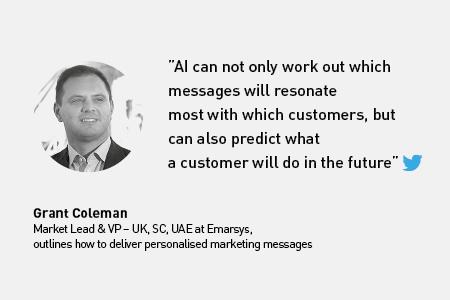Grant Coleman, market lead & VP – UK, SC, UAE of Emarsys, discusses how new technologies can help retailers to deliver targeted marketing messages
How do consumers expect to engage with retailers and brands?
“Consumers want to be able to reach out to brands in the same way they can reach out to anyone else – through websites, through Twitter accounts, through Facebook accounts and, even now, by calling on the phone. What matters is that the experience across all of these channels is seamless, and that customers are identified as one and the same person throughout all the interactions. “That level of personalisation needs to come from brands reaching out to consumers as well. Whether approaching consumers with deals and offers via email, the website or social channels, everything needs to be connected and consistent. Consumers just won’t tolerate impersonalised, irrelevant outreach. It will make them switch off rather than paying attention – and they certainly won’t go on to make a purchase or further interact with the brand.”
Have retailers achieved this? If not, where are they along their journeys? Are there any particular high achievers to mention here?
“We’re getting there. Some retailers, companies such as Brand Alley, understand the true importance of personalised, well thought-out communications across the entirety of their marketing channels. From sending an email specifically designed for the customer in question, based on previous interactions, purchases and browsing history, through to presenting customers with the same, tailored goods when they get to the website – and even on to making sure they’re shown relevant goods on their personal Facebook page. All of the above is aimed at showing Brand Alley understand their customers and what they’re most likely to be looking to buy. “This is still best practice, though. While a lot of companies now understand that untargeted ads or outreach won’t get them very far, there are still a lot of steps to be taken to ensure personalisation happens cross-channel and truly based on buyers’ shopping preferences. Simply acknowledging someone’s gender and age range in an email needs to move along to a true view of the customer, cross-channel.”
How do you think retailers will achieve this in the future?
“One of the issues with personalisation is just how much time it takes to personalise content manually for each individual customer or prospect – especially in the retail industry where brands have thousands, if not millions of customers that they want to target with their communications. And yet, it’s not just that personalising at scale is time-consuming that’s putting companies off doing it, it’s often physically impossible for businesses to do it, especially manually. “That’s where we’re going to see AI come to the fore in marketing. As retailers look to personalise at scale, a couple of steps are needed. First, the retailer needs to have – and be able to analyse – a lot of data so it can understand its customers and prospects, before to deciding which content they should be sent. Then, once that’s decided, retailers need to get those messages out and in front of the customer. “But how? Manually ‘dragging and dropping’ different messages to different audiences? That simply does not scale – something most marketers are acutely aware of. Even attempting to do it manually can use up days of manpower that could be better spent on other tasks, such as working out how to make the marketing function itself more innovative. “This is where AI is such an essential tool in helping retailers speak more personally to customers. AI can not only work out which messages will resonate most with which customers, but can also predict what a customer will do in the future, understanding what message will produce the best outcome. Imagine being able to work out which promotions, offers and product selection will perform best when offered to individual consumers? That’s far too big a job for any marketer to do manually, but it’s exactly how AI can help.”
What are the big challenges and benefits of doing so? And what happens if retailers don’t prioritise this?
“If retailers don’t start prioritising personalisation at scale, then they’re going to start missing out as their competitors will be approaching the same customers with better, more tailored communications about what they’re looking for. We’ve seen customers who have helped drive ROI significantly, both through customer satisfaction and through building closer relationships with the brands whose goods retailers sell. This builds trust from brands that a retailer is worth associating with. It’s not just a marketing benefit, it’s something that can help improve the whole business.”






